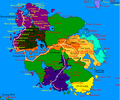Pan-Euran Highway: Difference between revisions
No edit summary |
No edit summary |
||
| Line 60: | Line 60: | ||
[[Category:Highways of Nouvelle Alexandrie]] | [[Category:Highways of Nouvelle Alexandrie]] | ||
[[Category:Transportation in Nouvelle Alexandrie]] | [[Category:Transportation in Nouvelle Alexandrie]] | ||
[[Category:Government agencies of Nouvelle Alexandrie]] | |||
Revision as of 00:49, 30 November 2023
The Pan-Euran Highway is a transportation megaproject in the Euran continent that initially aimed to build a series of highways, railways, and supporting roads to link the nations of Nouvelle Alexandrie (then, called Alduria), Antakia, Constancia, Raspur, and the Suren Confederacy. The Pan-Euran Highway will pass through many diverse climates and ecological types, ranging from dense jungles to arid deserts. This has offered plenty of political, engineering, and environmental challenges to the consortium of Euran nations in its design and construction, with the likelihood of some areas being fully passable only during certain seasons.
Highway features
-
A cross view (lanes) of the proposed Pan-Euran Highway.
History
Construction of portions of the Pan-Euran Highway began in earnest in Alduria and Constancia in 1684 AN, financed by a fund created by the governments of Alduria and Constancia to jointly finance their respective portions of the project while final terms were achieved with the Thraci Confederation and the Suren Confederacy to build their own connecting portions to the highway.
The Constancian section of the Pan-Euran Highway was managed and overseen by the Ministry for Reconstruction and Infrastructure of the Imperial Constancian Government. Construction on the Raspurid section of the Pan-Euran Highway was to be managed by government of the Raspur Khanate and overseen and funded by the Ministry for Reconstruction and Infrastructure of the Imperial Constancian Government.
In 1692 AN, Nouvelle Alexandrie announced that it had completed the expansion of highways and railways in the Region of Alduria, including their portion of the highway all the way up to the connection and border crossing facilities that would then connect to the portion of the highway that would cross the Thraci State of Antakia and connect to Constancia.
In 1694 AN, the territorial expansion of the Thraci Confederation into Razjania, a part of the Euran Green that Nouvelle Alexandrie and Constancia hoped to seize and split between themselves, led to a breakdown of diplomatic relations and even talks of war between the Thraci Confederation and the rest of its Euran partners. Accordingly, in that same year, the portions of the project that would cross the Thraci State of Antakia to connect with Constancia have been scrapped and cancelled.
As of 1694 AN, the governments of Constancia, Nouvelle Alexandrie, and the Suren Confederacy have agreed to create the Euran Economic Union and committed to the construction of the Pan-Euran Highway in the historic First Fontainebleau Accords. The new organization aims to further cooperation and economic integration, marking the Pan-Euran Highway as its first and key project to realize this goal. The design of a new route is underway, avoiding the Thraci State of Antakia entirely and presenting even greater engineering and construction challenges for the future of the project.
The success of Operation Paramount in 1698 AN revived the possibility of a direct northern route, albeit one that would now complement rather than supplant the revised southern route.
The termination of the Third Euran War also marked the occasion of Suren and Zeed returning to the project as actively participating partners, under the aegis of the Euran Economic Union and the Raspur Pact. Zeed Directive 5 created a a Zeed National Labor Reserve, comprised of:
- a. All representatives of Azad Eura, Calbion, Cimmeria and Raikoth, and the Tarr, whether military and civilian, within the meaning of Article 11 of the 1701 Armistice of Alduria City
- b. All Zeedic prisoners taken during the war within the meaning of Article 14 of the 1701 Armistice of Alduria City
- c. All able-bodied individuals who are or were part of all formations and personnel associated with the Revolutionary Armed Forces and the Revolutionary Government in Rusjar deemed suitable by members of the Allied Control Commission
under the command of the Minister of Labor. The Minister of Labor was directed to assist the Pan-Euran Highway Administration by deploying such members deemed necessary by the Pan-Euran Highway Administration of the Zeed National Labor Reserve to the construction and maintenance of the Pan-Euran Highway, and providing their operational command and control to the Administrator of the Pan-Euran Highway Administration.
All State Ministries and Agencies, including the Zeed Survey Authority, were directed to assist the Pan-Euran Highway Administration in the implementation of their mandate. Railway provision alongside the Pan-Euran Highway was mandated to be included. The Zeed National Railroad was directed to coordinate with the Pan-Euran Highway Administration on this matter.
Ironically, Operation Landslide would by 1708 AN clear the last of the obstacles to the original route being commenced upon. The recommendation of the Committee of Euran Salvation in Mehrshahr to the Secretariat of the Euran Economic Union in Fontainebleau was therefore to maximise the potential of the Pan-Euran Highway by embarking upon the construction of the Northern, Central, and Southern routes simultaneously.
Proposed historical routes
-
A map of the proposed Pan-Euran Highway (yellow line), starting in Amol, Alduria and ending in Mehrshahr, Raspur. (1683 AN.)
-
A map of the proposed Pan-Euran Highway (white line) after the Razjania Crisis of 1693 AN and breaking off relations with the Thraci Confederation. (1694 AN)

